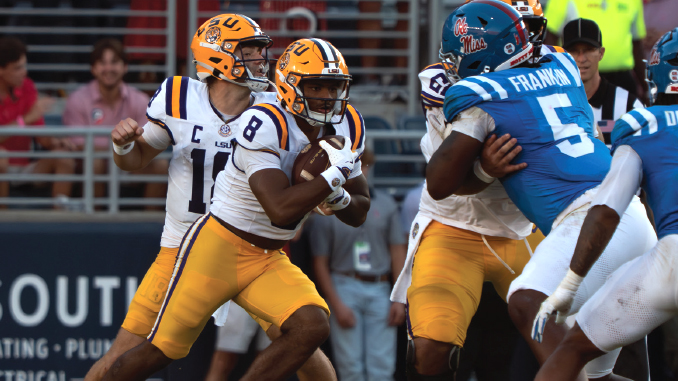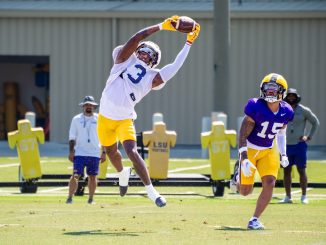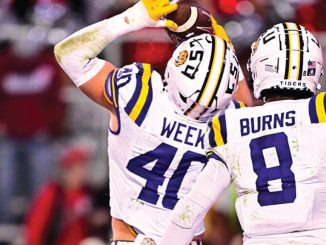
GLENN GUILBEAU, Tiger Rag Editor
LSU’s run game is bad. There is no question about it.
The No. 11 Tigers (4-1, 1-1 Southeastern Conference) are 117th in the nation out of 134 upper level programs in rushing yards per game with 104.8. The only SEC school worse will be at Tiger Stadium Saturday night (6:45 p.m., SEC Network). South Carolina (3-2, 1-2 SEC) is 120th with 99.8 yards a game and is a 9.5-point underdog.
The run game wasn’t supposed to be this bad. But it was not expected to be any good either. No one should be that surprised. After all, LSU was an awful running team last season at 107th in the nation and dead last in the SEC with 116.4 yards a game. And that was with a talented offensive line that put four starters into the NFL Draft, including two in the first three rounds – No. 4 overall pick Will Campbell and No. 91 pick Emery Jones.
LSU may have 2 new offensive line starters via injury serendipity.https://t.co/CBjeRlin0m
— Glenn Guilbeau (@SportBeatTweet) October 3, 2025
LSU’s lone returning offensive line starter from 2024 – center D.J. Chester – could not beat out transfer junior center Braelin Moore and is not playing much this season The Tigers have been playing five brand new starters on the offensive line, including redshirt freshman Weston Davis in the first four games before a concussion at right tackle, true freshman Carius Curne in the last game at Ole Miss at right tackle, and sophomores Paul Mubenga at left guard and Tyree Adams at left tackle with Moore and transfer senior Josh Thompson at right guard.
The Tigers managed just a season-low 57 rushing yards on 22 carries for a 2.6-yard average in the 24-19 loss at Ole Miss, which came in with the No. 120 rush defense in the nation at 190.5 yards allowed a game. And LSU made the Rebels look like the Fearsome Threesome, because Ole Miss played just three down linemen and dared the Tigers to run.
That was the worst thing about LSU’s running game at Ole Miss. The Tigers had the numbers advantage, and offensive coordinator Joe Sloan and coach Brian Kelly didn’t even try to run the ball for any length of time. Just 22 rushing attempts out of 56 plays when you have an ailing Garrett Nussmeier (abdomen strain) at quarterback, who has frequently been inaccurate and without much zip on the ball when he is accurate this season.
On only two occasions did LSU run designed running plays on a drive. And the second time, it worked well. On 2nd-and-5 from the Ole Miss 15 in the fourth quarter, freshman running back Harlem Berry gained nine yards up the middle. On the next play, he scored on a 6-yard run. It was too little too late, though.
“I had talked to the Saints. I had talked to the Vikings. There were teams reaching out to learn about this matter, that really liked him.” … Kyren Lacy attorney Matthew Ory; https://t.co/AXL3tccRVP
— Glenn Guilbeau (@SportBeatTweet) October 5, 2025
But how good did anyone really think this season’s running game was going to be with that offensive line? Sure, Kelly said he was “bullish” on his offensive line and expressed confidence in it before the season, but that’s what coaches do at times. It was more BS than bullish.
Even with LSU struggling with the running game all last season, the reason the Tigers lost three straight games (Texas A&M, Alabama, Florida) after a 6-1 start and No. 8 ranking was mainly because the defense could not figure out how to stop running quarterbacks, which was not exactly a new strategy. And Nussmeier went a little too much into his Brett Favre mode. And Sloan and Kelly didn’t try to stick with the running game enough.
But if the defense was as good then as it is this season, and if Nussmeier doesn’t throw five interceptions against Texas A&M and Alabama, LSU would have likely made the playoffs at 10-2 in 2024.
If Nussmeier didn’t have an abdomen strain against Ole Miss, LSU probably wins that game. Even with Nussmeier throwing for a career-low 197 yards, the Tigers still would have had a chance to win, if the defense can make a stop on Ole Miss’ 3rd-and-14 from the Rebels’ 47-yard line early in the fourth quarter.
LSU’s vaunted secondary that Ole Miss coach Lane Kiffin raved about up until kickoff allowed an 18-yard completion and two more consecutive completions for 20 yards on a TD drive that put the Tigers down 24-13 with 11:02 to play.
LSU defense had much to do with the loss at Ole Miss, too. https://t.co/4Dzm7zWZtI
— Glenn Guilbeau (@SportBeatTweet) October 1, 2025
LSU drove 80 yards in 14 plays and 5:58, including six rushes for 26 yards, to get within 24-19 with 5:04 left, but the Tigers never saw the ball again as their defense let them down.
Yes, LSU’s running game really sucks. And if it gets just a tad better, that will help. If it can just be average in the rest of its games, that will help. South Carolina comes in with the 70th rush defense in the nation with 143.2 yards allowed a game. Maybe LSU running back Caden Durham (ankle) will be back after missing the Ole Miss game. Surely, Sloan and Kelly can at least try to put up 130 yards rushing.
But whether or not LSU reaches the playoffs this season depends more on a very good defense – No. 14 in the nation against the run (84.4 yards a game) and No. 23 in total defense (293 yards a game) – playing better at clutch time. It also needs to improve in that secondary with those transfer All-Stars we have heard so much about – cornerback Mansoor Delane and safeties Tamarcus Cooley and A.J. Haulcy – playing up to their advertisements. LSU is 62nd in pass defense with 208.6 yards allowed a game.
“I think you’re going to see the best football as we move forward from Garrett Nussmeier.” … Brian Kelly. … WR Aaron Anderson injury update. https://t.co/sqF9FjLW1e
— Glenn Guilbeau (@SportBeatTweet) October 1, 2025
And LSU’s future depends on Nussmeier returning to something closer to what he was last season when he finished sixth in the nation in passing yards a game with 311.7. He is 53rd in the nation at the moment with 231.8 yards a game. When he is accurate deep, LSU’s receivers need to start making the catches, even if they are well covered. That’s what the great ones do.
“Look, everybody wants to talk about the running game, and I get it,” Kelly said last week. “I get it. But we also have to accentuate the positives of this team, and that’s our skill players, and our quarterback.”
He’s exactly right. And only an average running game the rest of the way is needed anyway. Ohio State won the national championship with 166 rushing yards a game for 58th in the nation last season. Its passing game was 29th and its defense No. 1. Michigan won the 2023 national title with the No. 54 running game at 169.1 yards a game and the No. 1 defense.
LSU won the 2019 national title with the No. 60 run game at 166.8 yards a game with the No. 2 passing game. Clemson won the national championship in 2016 with the No. 71 running game at 169.7 yards a game and the No. 7 pass game and No. 8 defense.
The point is, LSU could have five more open dates and work on the running game every day, and it may never be decent, but at least stick with it. Five-time national champion LSU baseball coach Skip Bertman had the same philosophy as Kelly as far as “accentuating the positives.” Bertman often worked on his team’s strengths more than its weaknesses, because the latter improving would not be as significant as the strength getting even stronger. And it is usually less difficult to fine tune than to overhaul.
“So, the problem for us more than anything else is we have not been elite in the passing game,” Kelly said. “So, that’s been a huge focus this week. Doesn’t mean we’re not working at getting better at the running game. We’re working diligently there, but my point being is our passing game has to be much more explosive than it has been up to this point.”
If Nussmeier can improve his accuracy and zip via getting healthier, it could happen.
Asked what he prioritized during the opening week, Kelly made it clear.
“First and foremost, the details of the passing game have to be better,” he said. “And that is from a coaching standpoint and a playing standpoint. We just need to be better there. Garrett threw 15 touchdown passes at this time last year. He’s thrown seven this year. We averaged over 300 yards passing the ball. We’re well below those numbers.”
But if South Carolina comes out with just three at the line of scrimmage and eight in the back for passes, Sloan better call more runs. Just in case he doesn’t, look for Kelly to have a play chart in his hand as he did when the offense struggled late last season.
“That’s why I’m angry again today. I haven’t been able to get it out.”
— Glenn Guilbeau (@SportBeatTweet) September 30, 2025
-Brian Kelly to Paul Finebaum on losing “winnable” game at Ole Miss:https://t.co/19qRhSOPLD
“We have to be able to have answers for drop eight,” Kelly said. “We had answers, but we needed to do more of it.”
Ole Miss used three down linemen and dropped eight 86 percent of the time, and Sloan and Nussmeier kept passing.
“You’ve got to have some other answers,” Kelly said. “And so, that’s what I didn’t like about the game plan. We needed more answers during the game.”
Correct. But if Sloan keeps giving the wrong answer in future games, Kelly shouldn’t just say after the game that he didn’t like the plan as he said last week.
Change the plan DURING the game.
Because you’re the head coach.




Be the first to comment